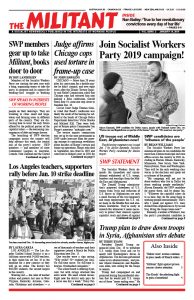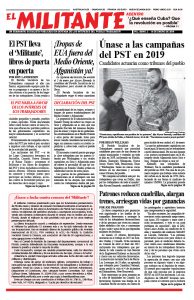The Donald Trump administration’s announced intention to draw down U.S. troops from Syria has been portrayed by many media outlets as an unexpected betrayal of Kurdish forces who have been the key troops in the fight to liberate areas of Syria seized by Islamic State.
In fact the U.S. rulers have a decadeslong record backing the suppression of the Kurds’ fight for national rights as Washington seeks to create stability for its imperialist interests in the region. On occasion, Washington has provided aid to Kurds when doing so advanced their own predatory objectives in the Middle East.
Some 30 million Kurds live in an area divided among the rulers of Iran, Iraq, Syria and Turkey. Kurds were denied a homeland after the fall of the Ottoman Empire at the end of the first imperialist world war. The British and French rulers carved up the region to serve their imperialist interests.
As the capitalist ruling families in these Mideast countries threw off colonial and semicolonial control over their country’s resources, they sought to bolster their rule and defend the territory under their control by maintaining subjugation of the Kurdish people.
In Syria the Assad family’s Baathist Party regime denied citizenship and language rights to hundreds of thousands of Kurds in the 1960s. It confiscated land owned by Kurds and settled Arabs on it, dispersing the country’s Kurdish population to undermine their fight for national rights.
A popular revolution swept Iran in 1979, overthrowing the U.S.-backed regime of the shah and unleashing advances for the workers’ movement, for women and for Kurds and other oppressed nationalities. In the course of the revolution, councils of working people were established nationwide, including in Kurdish areas. The capitalist rulers responded with counterrevolutionary assaults and imposition of brutal repression in the Kurdish region, which continues today.
Rebellions against the Turkish rulers’ suppression of Kurds’ national rights in 1925 and again in 1937-38 were put down in blood. Since 1984 the Turkish government has unleashed a reign of terror in response to an armed struggle initiated by the Kurdistan Workers Party (PKK), a party with Stalinist roots. Some 40,000 people have been killed in this ongoing conflict.
For decades the oppressed Kurds in Iraq had fought regime after regime. As part of the wars launched by the U.S. rulers there beginning in 1991, Washington occasionally found it useful to back Kurds fighting for autonomy to weaken the Saddam Hussein regime. But when the Kurds revolted and drove out Baghdad’s forces, Washington stepped aside and allowed Saddam’s regime to unleash its troops, bombers and gas attacks against the rebel population. Thousands were killed in Halabja when Saddam’s regime carried out a deadly chemical weapons attack on March 16, 1988.
An unintended consequence of the decadeslong wars the U.S. rulers have waged against the people of Iraq has been the establishment of a semi-autonomous Kurdish region. But when the Kurds voted overwhelmingly for independence in a September 2017 referendum, Washington stood aside when the Turkish, Iraqi and Iranian governments joined forces to prevent its implementation.
Despite decades of repression the capitalist rulers across the region have failed to crush the Kurds’ national aspirations. The fight for their national rights can advance when it is backed by struggles by working people against landlord and capitalist exploitation and imperialist domination, as opposed to searching for sponsorship from the capitalist rulers. The history of the Kurds’ heroic struggle for sovereignty has shown time and again there is no future in relying on “allies” in Washington.

